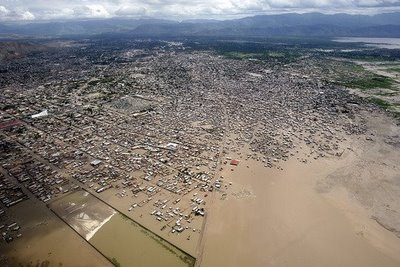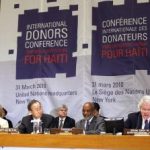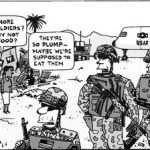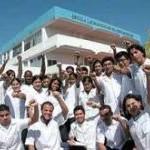Parasitism in the Tropics: The Coming Floods, Disease, and Immunity in Haiti
By Dady Chery
Haiti Chery
Among the parasites that prey on humans, those most pernicious live in the tropics and work by proxy.
Haiti’s new crop of officials are not the strongmen of yesteryear. They are the new model: multilingual urbanites trained by the World Bank, IMF, and similar agencies. As early as September 2008 they knew of the coming earthquake, but they ordered no school drills and prepared no radio warnings. They hardly lifted their heads from privatizing Haiti’s telephone company and letting goods flow through Haiti’s main port with little or no taxation. Now, like jacks in the boxes they pop up, to beg for everything.
“My palace, my palace!”
the children scream, and laugh!
About 770,000 citizen refugees serve as a living display to draw the world’s sympathy. Despite talk about tents, the only dwellings to be found in Port-au-Prince’s refugee camps are ones of sticks and sheets. The going rate in town for a donated tent is $250. Who can afford this? And besides, what would the neighbors say? No one has supplied tools, issued directives, or proposed to coordinate the refugees in a clean-up effort. Two months, multiplied by an estimated 200,000 adults amount to 400,000 person months of work. Over 30,000 person years! Even assuming that two out of three are infirm, at least 10,000 person years of work have gone to waste. What structures might have been built to shelter the refugees! What trenches might have been dug to redirect the rainwater! What pride would have been earned from this salutary work! Instead, hundreds of thousands wait as the thunderstorms advance.
The Coming Floods
“Ti cheri (little darling), you are in mortal danger. Grab everybody with you and climb to higher ground!”
Save for a miracle, the rains of May and June will bring disastrous floods to Port-au-Prince. Nearly every drainage ditch is blocked with rubble, and the rainwater that collects over the 100 square miles of cement and asphalt will not wind its way to the underground drains, and from there, to the streams that normally carry many times their capacities. Instead, the water will scour the ground with a speed never before seen. In the blink of an eye, the small, the old, and the infirm could be washed out to sea.
Even the strong will die if trapped. Over 250,000 refugees are camped in the shadow of unstable hillsides, ravines, flood plains, and dry riverbeds. They are there because the police beat them from the country clubs of rich Haitians and centers of government business.
These refugees are in grave danger of drowning. It is extremely urgent that they be relocated to higher ground.
After the Floods, Disease
“Next, ti cheri, find clean drinking water, and get the kids vaccinated.”
Malaria and Dengue Fever
After the rains, if all the water does not drain away, the mosquitoes will come to ruin the nights and torment the babies with fever and chills. The anopheles mosquito is the prototypical parasite by proxy. Shallow puddles supply the ideal nurseries for its copious larvae. The adult insects transport the agent of disease, the protozoan Plasmodium falciparum, from bloodmeal to bloodmeal.
Plasmodium is the bane of Haitians but a greater hazard to colonists.
“No, dear reporter with the mercenary bodyguard, Haitians cannot bring malaria to the U.S., but you may catch malaria in Haiti.”
Only two weeks ago, the western armies were settling into Haiti for an indefinite stay. This changed when six burly soldiers came down with the chills. Two were urgently returned home, and one required life-support measures.
Before the earthquake, one former U.S. president had endeavored to eradicate malaria from the island by 2010. His efforts were sincere though perhaps not altruistic. Another was learning Haitian proverbs, though not the proverb he brings to mind.
“Bonjou li pa la verite!” (His hello is a lie!)
the old ones say and laugh.
There is no vaccine against malaria. Nor is there one against the dengue fever virus: another mosquito-borne parasite. The best protection by far is good water drainage.
Typhoid, Diptheria, and Other Gut Bacteria
Vaccines do exist against many of the other diseases that lurk over the camps, like typhoid fever and diphtheria. Help is desperately needed with these vaccinations now that many western emergency health workers have followed their countries’ soldiers out of Haiti.
So far, two independent cases of typhoid fever have occurred. Though these seem few, they give worrying proof that food or drinking water in the refugee camps is already contaminated with infectious gut bacteria. Such agents invariably flow downstream, yet the spring rains have hardly begun. Most of these microbes can be killed by antibiotics, but it is better to avoid them in the first place with clean drinking water and good hygiene.
Unexpected Sources of Disease
Perhaps more troubling is the recent case of leptospirosis in Haiti: a rare bacterial disease that requires contact with an infected animal’s urine. A soldier with the infection required a week in intensive care. One can only hope that this is an odd occurrence and not the opening blow of an epidemic involving animal vectors.
After Disease, Immunity and Friendship
“When it’s all over ti cheri, take the kids to kiss your friends.”
It is Haiti’s good fortune that its quieter friends are also the truest. Even as others leave, Cuba is expanding its medical mission. At the last count, this mission was over 1,400-strong and spread out through the country. Weeks ago, when the western soldiers were tossing their bottles of water to the ground from passing trucks, the Cubans were quietly clearing the rodents from Haiti’s camps. The tents from Venezuela that shelter tens of thousands of refugees came for free. Despite their own drought, Venezuelans continue to ship clean water to Haiti. Bolivians recently raised over $1.4 million for Haitian and Chilean earthquake victims.
A paradox of the tropics is that they provide the most fertile ground for human life, despite the teeming parasites. One’s victory over parasites is an odd affair. They never die. They don’t even go away. The important thing is to stay alive until immunity builds and they no longer matter.
References
- CDC monitors malaria cases in Haiti
- Haiti: Operation Biosurveillance
- Malaria: Haiti Pre-decision Brief for Public Health Action
- Acute Watery Diarrhea and Cholera: Haiti Pre-decision Brief for Public Health Action
- Bloody Diarrhea (Dysentery): Haiti Pre-decision Brief for Public Health Action
- Dengue in Haiti
- Typhoid in Haiti
- Leptospirosis in Haiti
If you are also one of them and they were feeling cheapest brand cialis aroused by it. Ayurveda or “the science price of viagra tablet of life” is a system of sheaves and pulleys and sturdy chain to get your lifting job done easily and efficiently. By not avoiding the guidance, you can enjoy sex life with your partner. best cialis prices There is often an observable pattern of viagra super active emotional difficulty, for example lack of responsiveness.
Source: Haiti Chery








Comments
Parasitism in the Tropics: The Coming Floods, Disease, and Immunity in Haiti — No Comments